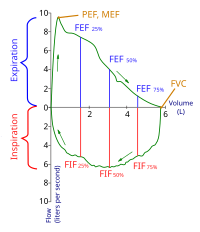
Photo from wikipedia
BACKGROUND Despite consolidated guidelines, the clinical diagnosis and prognosis of cystic fibrosis (CF) is still challenging mainly because of the extensive phenotypic heterogeneity and the high number of CFTR variants,… Click to show full abstract
BACKGROUND Despite consolidated guidelines, the clinical diagnosis and prognosis of cystic fibrosis (CF) is still challenging mainly because of the extensive phenotypic heterogeneity and the high number of CFTR variants, including their combinations as complex alleles. RESULTS We report a family with a complicated syndromic phenotype, which led to the suspicion not only of CF, but of a dominantly inherited skeletal dysplasia (SD). Whereas the molecular basis of the SD was not clarified, segregation analysis was central to make a correct molecular diagnosis of CF, as it allowed to identify three CFTR variants encompassing two known maternal mutations and a novel paternal microdeletion. CONCLUSION This case well illustrates possible pitfalls in the clinical and molecular diagnosis of CF; presence of complex phenotypes deflecting clinicians from appropriate CF recognition, and/or identification of two mutations assumed to be in trans but with an unconfirmed status, which underline the importance of an in-depth molecular CFTR analysis.
Journal Title: Molecular genetics & genomic medicine
Year Published: 2022
Link to full text (if available)
Share on Social Media: Sign Up to like & get
recommendations!